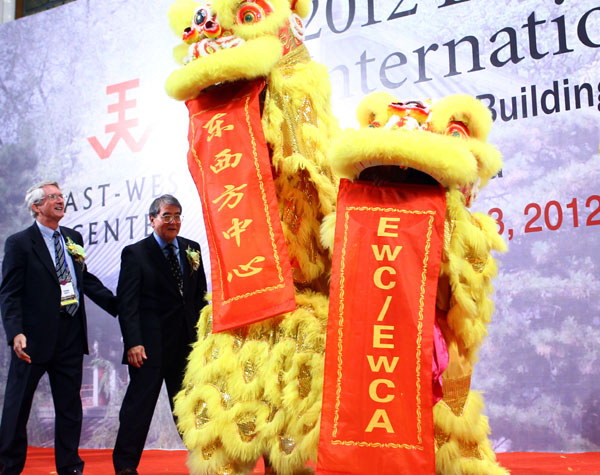
Locke kicks off international meeting at Peking University for East-West Center
A strong partnership of the United States and China will benefit both countries and the entire Asia-Pacific region, said US Ambassador to China Gary Locke on Saturday, calling for a way that the two countries can co-exist and cooperate without unhealthy competition or conflict.
Locke made the remarks at the opening ceremony of the three-day East-West Center's 15th biennial international alumni conference held at Peking University in Beijing.
At the conference themed "community building and leadership in the Asia-Pacific", Locke's speech got special attention as US Secretary of State Hillary Clinton has begun a six-nation tour to Asia, which will include a stop in China next week.
 |
|
Edward Shultz (left), president of the East-West Center (EWC)'s Alumni Association executive board and Rick Brian Tsujimura, chairman of the EWC board of governors, present at EWC's 15th biennial international alumni conference on Saturday in Beijing. Zou Hong / China Daily |
Locke said conflict between a rising power and an established power is not inevitable, a point that has been made by both countries' leaders. "We can - we must - together forge a relationship, one based on mutual respect and mutual benefit".
"Both a strong United States and a strong China are good for the Asia-Pacific region, because geopolitics today cannot afford to be a zero-sum game," he said.
Locke called for more cooperation between the two counties in areas including trade, investment and people-to-people exchanges despite differences on some international issues and trade frictions.
"We welcome Chinese investors to come to the United States and to invest the same way other foreign investors do," said Locke, noting that China's investment into the US creates jobs, boosts US exports, and creates stronger economic and commercial ties.
Chinese direct investment in the US increased almost eightfold between 2005 and 2011 - from $700 million to $5.4 billion - and is on a record pace so far in 2012, with $3.6 billion in deals completed in the first half of this year, according to official figures.
Locke also stressed the role of people-to-people exchanges, which "foster a mutual understanding between the two peoples and facilitates collaboration and cooperation in every field".
After streamlining the visa process, US consular officers in China have processed more than 1.1 million visa applications so far this fiscal year (Oct 2011- Sept 2012), a year-on-year increase of 42 percent, with shorter wait times for visa appointments, Locke said.
The US will continue to propose the two countries issue reciprocal, five-year visas for business, tourism and study, said Locke.
Locke said much credit should be given to the East-West Center for building understanding between the US academic community and professionals from throughout the Asia-Pacific region, in China and elsewhere.
More than 4,000 research specialists, graduate students and professionals from China have participated in programs of the EWC, based in Honolulu, Hawaii. It was established in 1960 by the US Congress to strengthen relations and understanding among the peoples and nations of the US, Asia and the Pacific. Since 1981, China Daily has established cooperation with the center and sent about 120 journalists to study there.
Rick Brian Tsujimura, chairman of the EWC board of governors, told conference participants that "everybody here is an 'ambassador', the relationships forged between each of you are the keys to mutual understanding and help to solve to the struggle we each face in the world".
Zhang Xiuqin, director of the Department of International Cooperation and Exchanges of the Ministry of Education, said both countries agreed that education is the key field for people-to-people exchanges and the two governments have strengthened cooperation in this field.
"China is the largest developing country while the US is the largest developed country. We have different social systems, cultural tradition and we are in different development stage, so misunderstandings at some extends are inevitable," she said. "Only tolerance and understanding will bring mutual benefits and win-win cooperation".
About 300 people, most alumni of the East-West Center, gathered for the conference featuring about 75 substantive presentations and panel meetings on current regional topics including international relations, economics, environmental protections and other social issues.
Contact the writers at [email protected] and [email protected].